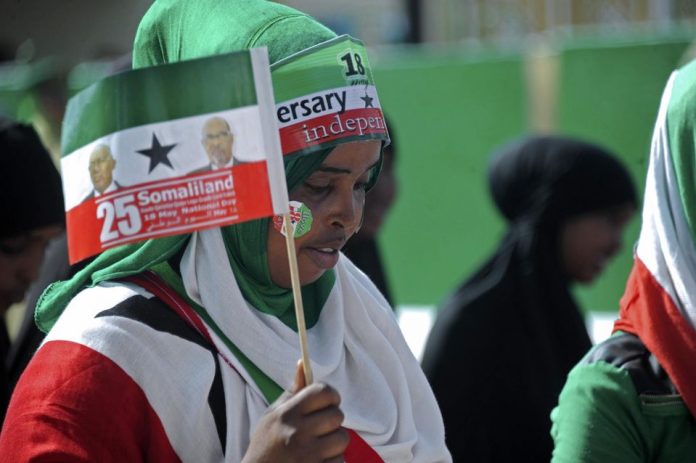Voters in Somaliland are called to ballot on Monday to nominate their president. An election deemed exemplary, although the international community still refuses to recognize this small country, which is an island of stability and peace in the Horn of Africa.
It is a country that officially does not exist. And yet this Monday organizes its third presidential election with democratic guarantees, which no other country can claim in this troubled region of the Horn of Africa. Yes, but now, although stable and peaceful for more than twenty-five years, Somaliland has never been recognized by the international community. At issue: the sacrosanct rule of the inviolability of borders in Africa. Which was violated during the creation of South Sudan in 2011.
READ ALSO Somaliland, a coveted oasis
This Monday, the long lines in front of the polling stations in Hargeisa, the capital, will finally convince the United Nations to recognize a country that, although isolated politically and financially, has managed to avoid the rifts that bloody neighboring Somalia, Somaliland broke away after ten years of civil war in 1991? Not in the immediate future alas, despite this vote, admittedly twice postponed (it should have been held in 2015), which wants to be exemplary.
Three suitors
The outgoing president, Ahmed Mohamed Silanyo, does not run again. He was himself in opposition when he was elected in 2010. His nominated colt, Muse Bihi Abdi, a former Air Force officer, now head of the ruling Kulmiye party, certainly favorite. But everyone agrees that the electoral competition promises to be transparent between the three parties authorized by the Constitution. In particular, the main challenger of the candidate of power, Abdirahman Mohamed Abdullahi, former diplomat and former President of the Assembly, nicknamed “Irro” (“gray”) because of the color of his hair The third candidate, Faisal Ali Warabe, a former engineer, plays the role of outsider in an election, which even gives lessons of technological innovation to the rest of Africa. For the first time on the continent, a biometric system of recognition by the iris will be applied. And the counting of votes will be monitored by 60 international observers funded by the United Kingdom, added to the 620 national observers.
READ ALSO Somaliland nomadic people down the road
In these conditions, the smooth running of the ballot may highlight even more the gap with the failures observed in the region. Neighboring Somalia has indeed held elections in February, but due to the country’s instability, still subject to regular Islamist shebab attacks, it is through a system of cooptation and not universal suffrage that the southern neighbors have appointed their new president. As for Kenya, voters had to return to the polls in October due to the cancellation of the vote by the Constitutional Court, in a particularly tense context.
For the other two neighbors, Djibouti and Ethiopia, the transparency of the elections is still a mirage. But it is obviously the comparison with “official” Somalia which remains the cruelest for the small Somaliland, and its 137 000 km 2 growing against the Gulf of Aden, wedged between Djibouti, Ethiopia and therefore Somalia. Despite numerous external military interventions and the constant attention of the United Nations, the only Somali entity recognized by the international community, is still plagued by clan divisions, and remains under the threat of Islamist Shebabs, who, despite being driven out of Mogadishu 2011, still control important territories and continue to exercise their capacity for harm in the capital as shown by the attack of 14 Octoberwho made 358 dead. The fate is all the more unjust since, in the end, Somaliland and Somalia have formed a single nation for only a relatively short time.
exemplary
From the end of XIX th century independence, Somaliland has generally remained a British colony, with the exception of a short-lived occupation in 1940 by the Italians that they had already conquered long the southern part, the current Somalia. At independence in 1960, the two units chose to merge, but the dictatorial drift of Siad Barré led the north to revolt in the early 80s. Ten years later, the dictatorship collapsed, opening a long period of instability in the south while the north proclaimed its independence. It was at this time that the destiny of both countries was forged: “Somaliland incorporated its former clan-based conflict management mechanisms into British common law to achieve a form of democracy”,recalled in 2010 in Le Monde Diplomatique, the researcher Gérard Prunier, one of the best specialists in the region.
However, for the moment, Somaliland’s “example” continues to face the rigidity of the international community. Some might argue that it is precisely his isolation that has pushed Somaliland to be exemplary.
But for how long ? In the absence of formal international aid, it is the Gulf countries, and in particular the Wahhabi foundations, that would now finance many mosques and schools in a country where Islam is so far predominantly Sufi. Some observers also point out that the youth of this country (70% of whose inhabitants are under 30 years of age) suffer massive unemployment and reject more and more openly the influence of seniors on public life. The young people were also less likely to register on the electoral lists which have 700 000 registered on 4 million inhabitants. For a day of voting, a ghost country is an example of an island of peace and stability that remains fragile.
By





























